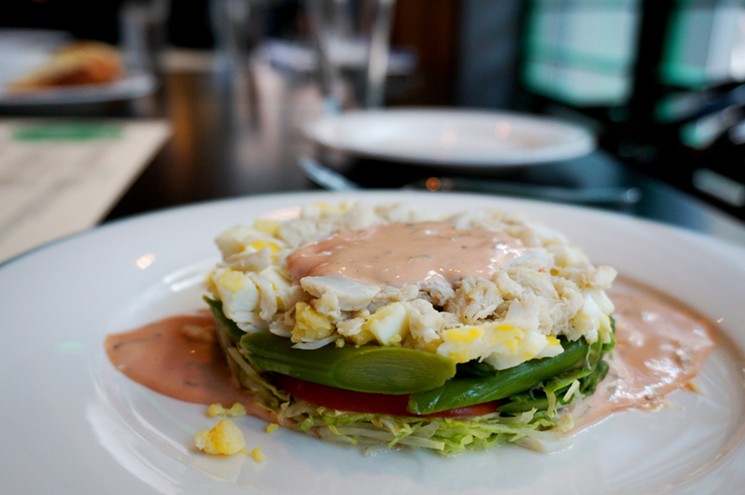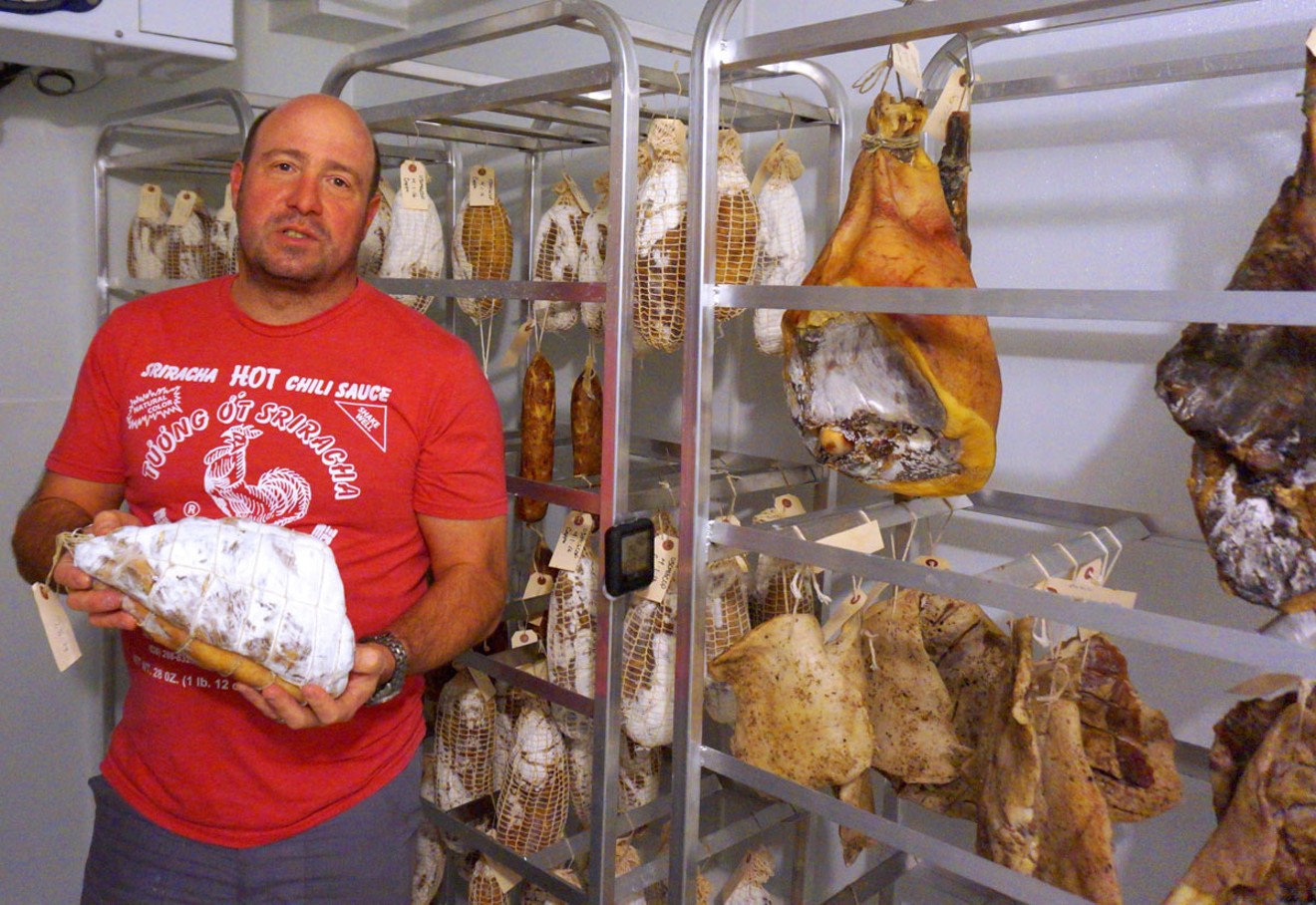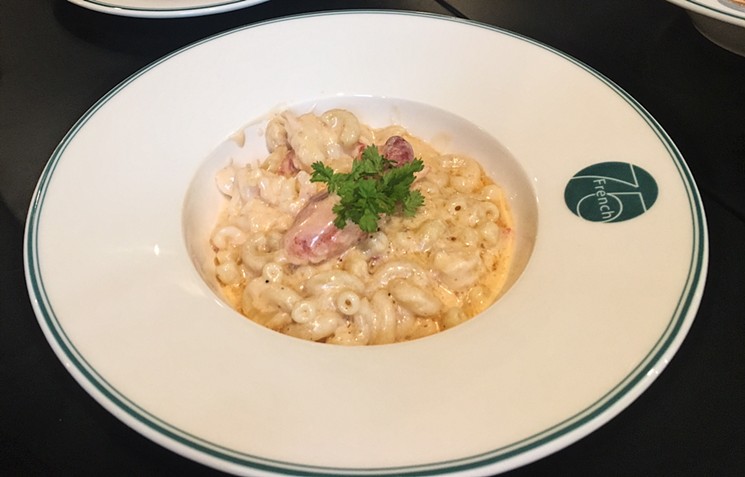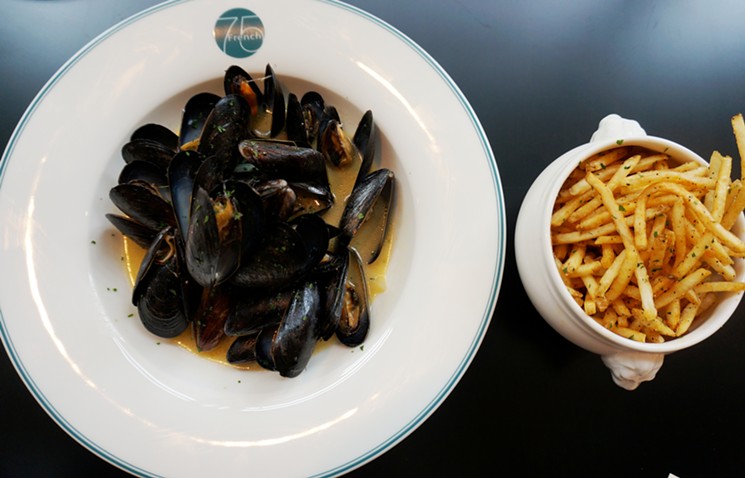We recently sat down with Frank Bonanno to talk about how Denver dining is changing, why he keeps opening restaurants, and why getting fired by Mel Master was the best thing that ever happened to him.
Westword: Let’s start with the brand-new French 75, the tenth restaurant in your portfolio. What was your vision here?
Frank Bonanno: I have always wanted to do a French bistro. Osteria Marco was about making an affordable and fun and whimsical version of Luca; we thought we could do the same thing as a spin-off of Mizuna. So French 75 is the little brother to Mizuna. There are things on the menu that we’d never serve at Mizuna; we’d never serve French onion soup or a crabcake, and I love Mizuna for that. But this was an opportunity to cook how I love to cook — to take truly fucking simple food and make it sing on a plate. And these guys in the kitchen are drinking the Kool-Aid. It’s a lot of fun to circle back to my first exec job at Mel’s. Those dishes — like the salmon with whipped potatoes and asparagus — resonated with me. That’s what I have the opportunity to do here. Straightforward French food is what I love. It was clearly my first passion, or I would have opened an Italian restaurant first.
How did you end up downtown?
This thing started three years ago. I just saw it as an opportunity. The landlord is unbelievably generous, and they made me a deal I couldn’t refuse. They’ve been a dream to work with. This is a business community, and I felt like this food would resonate with a businessman or -woman.

Cool off with crab Louie on a chilled plate at French 75.
Mark Antonation
I am successful because of Mel Master. He truly inspired me and cared and understood simplicity. [My now-wife] Jacqueline and I did the long-distance thing for a year while I finished culinary school. I was getting close to being finished, and she was like, “This guy Mel is opening in Cherry Creek.” She put a résumé together for me and sent it to him. When I got back, they had already opened, and they’d been open for a year or so. Mel called me and said, with his British accent, “Frankie, I’d love to have you as part of the team, but I can’t put you at Mel’s.” At the time, he also had Bruno’s, which was a red-sauce Italian restaurant. My résumé was all red-sauce Italian restaurants from New Jersey and New York. So he said, “Can you go fix this place for me?” I became the executive chef. The goal was very clear — it was to turn this place around, make it profitable and then get rid of it. That’s what I did. When he sold it, I moved to Mel’s, where I was co-chef with Tyler [Wiard]. We complemented each other really well. I’m horrible at expediting; I can’t call tickets for the life of me. When I work in my restaurants today, I work the line on pasta so I don’t have to call the tickets. But I could put all our inventory on spreadsheets. When I worked for Mel, if I tried to quit, he would say, “How would you like to go to Italy and work? How would you like to go to France and work?” Then I’d go and come back for another six months. That’s how he shaped me; he sent me to these amazing places that truly shaped my career.
But eventually you did break free, because you now operate your own restaurant group.
He fired me! I came back from my honeymoon, pulled into the parking lot, and Charlie, our attendant, said, “What are you doing here? I heard Mel fired you.” I went into the restaurant, and Tyler wouldn’t look at me. Mel called me up to the office and said, “Frank, I think it’s time we part ways. But would you mind staying on for a month to train people?” At that time, I did every dessert. I went downstairs for about half an hour and then said, fuck that, I’m not going to do that. I pulled some pages out of my notebook and handed them to Tyler and said, “Good luck to you.” Mel had heard that I’d looked at a space where Hapa Sushi is. So he was like, fuck you, Frank, you’re gonna open a restaurant right around the corner. It was the best thing that ever happened to me. He gave me a great severance. I took up golf and played every day for six hours. In October, I went and took my player ability test to get my PGA card. I was going to become a teaching golf professional. Jacqueline was pregnant, and I thought I could work at Denver Country Club teaching golf for $70,000 a year and be home for dinner every night.
How did Mizuna come together?
I went home for Christmas, and Doug Fleischmann, the old GM from Mel’s, called me in the airport and said, “Hey, I’ve got a great opportunity. Do you know Aubergine? Sean [Kelly] wants to sell it. Would you consider being my chef?” I said, “No, but I’d be your partner.” So we met with Sean, we met with CoBiz Bank, and we bought it. Jacqueline, Doug and I transformed the restaurant ourselves. I have memories of staining the bathroom floors at 2 a.m. I said, we’re gonna run this as a true French line. No one is doing this in Denver.
And then you started growing.
We were very successful in the beginning. But as busy as we were, Mizuna was not making enough money to support all of us. We needed to do something else. One night, I was out back having a chew, and Suki from China Grill was having a cigarette. I asked her, “Would you consider selling to us?” She said yes, and right there on the spot, I cut a check for $10,000 as a deposit, and we had a deal. We opened Luca on February 15, 2003, and Doug was killed by a drunk driver on June 22. Luca opened horribly: We invaded Afghanistan in 2003, and we had this six-foot snowstorm that broke all the windows. When Doug was killed, no one knew what to do. Here was this chef who just lost his business partner, with his second restaurant in its fourth month. We eventually did catch our groove at Luca — obviously, because it’s now fifteen years old. And Jacqueline came to work with us full-time.
How does your partnership with Jacqueline inform the vibe of the company?
I think it’s one of the things that makes our culture and family so great: If it’s a husband and wife running the two divisions, there is no division between the front and back of the house. We’ve been very lucky. We’ve had fourteen people who’ve worked with us open their own restaurants, and nothing makes me happier. That makes me feel like I’ve been doing something right.
You’ve been lucky enough to only have to close one restaurant. Any lessons learned in that experience?
Lou’s had a lot of things that I was proud of that the neighborhood never got — French onion soup, escargot. We didn’t judge the neighborhood very well over there. But the best thing I ever did was buy that building. Mike Peshek was the chef there, and he turned it around to profitability before we sold it. He just got it. The hot and naked chicken was hugely popular, and people were coming for it. That chicken came out of a trip to Nashville. Johnny DiPierro, who was the chef at Bones, and I went to Hattie B’s, and he just sat there saying, “We gotta do this fuckin’ chicken.” It couldn’t work at Bones because it didn’t have a fryer, but I said we could do it at Lou’s.
You’re considered one of the forefathers and originators of the restaurant explosion we’ve been witnessing here in Denver. How has the industry changed since you opened Mizuna in 2001?
Dining in Denver is changing because you stay in your neighborhood. I don’t think fine dining is going away completely, but destination dining is fading. So dining is neighborhood-focused. I’m guilty of it. I do go to every opening, but at the end of the day, you’re hanging out at your house after swimming or playing golf, and you just want to walk and go get dinner. That’s where dining is going.
So where is restaurant number eleven going?
French 75 is what we’re focused on. Jacqueline and I could have been done after Osteria Marco, frankly. We live a pretty modest lifestyle, and we own our house that my kids will pull me out of when I die. I could be done. But I have so many people who work with us that need to make more money. I need to make sure Burton Koelliker [former executive chef at Osteria Marco, now Bonanno Concepts Regional Chef] is making more money than he ever thought possible. I want to be sitting, all of us, in Hawaii in ten years, saying, “I can’t believe how well we’re doing.” That’s what necessitates opening other restaurants.
French 75 is located at 717 17th Street. Hours are 11 a.m. to 9 p.m. Monday through Thursday, 11 a.m. to 10 p.m. Friday, and 5 to 10 p.m. Saturday. Find out more at 303-405-7575 or french75denver.com.













